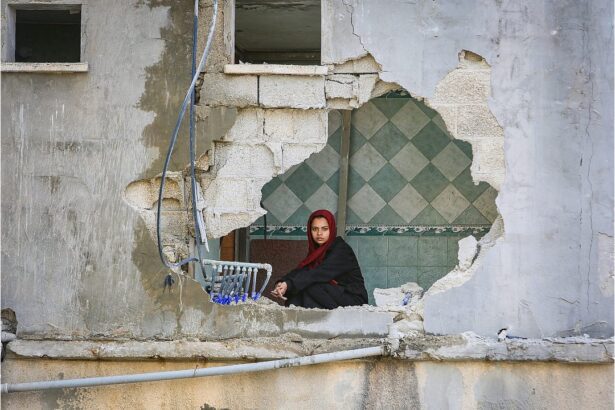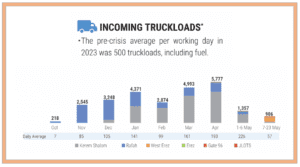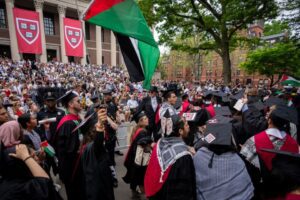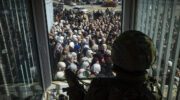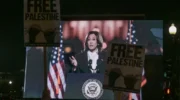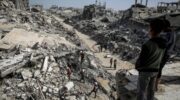Friday’s ruling by International Court of Justice welcomed by legal experts; not by Israel; some people in Gaza surviving on three per cent of the minimum standard for daily water needs; Media Freedom Coalition on the closure of Al Jazeera in Israel; Gaza pier is broken; first arrest made over UCLA counterprotester violence; Harvard graduation protest; more
By IAK staff, from reports.
Main elements of Friday’s ruling from the Int’l Court of Justice:
- The ICJ’s ruling orders Israel to immediately halt its offensive in Rafah in southern Gaza.
- The court calls on Israel to allow international investigators to enter the enclave to conduct inquiries.
- It also orders the Rafah crossing to be opened for unhindered provision of basic services and humanitarian aid.
- The ICJ asks Israel to report back to the court within one month on its progress in applying measures ordered by it.
Israel is killing and injuring children at a rate that is unprecedented compared to any modern conflict. On average, Israel has killed about 75 children in Gaza each day.
Many of the children who’ve survived have sustained lifelong injuries; an average of over 10 children are having one or both legs amputated every day in Gaza. Doctors in the region say that Israeli snipers have also been targeting children.
The ICJ ruling was welcomed by legal scholars and experts:
Legal expert Mark Kersten called it a “landmark decision”.
“Whatever doubt existed (or was sown by bad faith actors) it is absolutely clear that the people of Gaza are at risk of genocide, and that the way to stop the genocidal violence is a halt to hostilities,” Kersten, an assistant Professor of Criminology at the University of the Fraser Valley, Canada, said.
Another academic, Gerhard Kemp, said that while the order is less in terms of what South Africa asked for, it is still “extraordinary and crucial”. It shows that it is being done to protect Palestinians from a “potential act of genocide”.
“It (the order) is not ‘micromanaging’ Israel’s military operations, but is an extraordinary intervention to halt a specific military operation to save the Palestinians from a potential act of genocide in Rafah,” said Kemp, a Professor of criminal law at the University of the West of England, Bristol.
Renowned war crimes Prosecutor, Reed Brody, said the World Court has left Israel and its Western backers with “very little wiggle room”.
“This legally binding and very specific ruling leaves Israel and its supporters with a very little wiggle room”.
According to the Hungarian-American human rights lawyer, who had been involved in the prosecutions of Chile’s former President, Augusto Pinochet, and Chad’s former leader, Kosune Habre, the ICJ has “stepped up to the plate with a decision that responds to the escalating gravity of the situation”.
“It has crossed a threshold, for the first time, by ordering Israel to halt military operations as well as to open the Rafah Crossing and other crossings and allow access to international fact-finding missions.”
Michael Becker, a former ICJ staffer and international law expert, told Anadolu: “This is not only a further recognition by the ICJ of the extraordinary humanitarian crisis in Gaza. It can also be viewed as a sharp rebuke to Israel.”
According to Becker, the ruling suggests that the World Court views Israel as incapable of carrying out this war in ways that avoid violating the Genocide Convention or respecting the fundamental rights of the Palestinian population of Gaza.
“Up until this point, the ICJ has declined to indicate provisional measures against Israel that expressly require a suspension of military operations. By doing so today, at least with respect to Rafah, the Court has indicated that it no longer sees any other means of protecting the rights of the Palestinian population in Gaza,” he said.
Becker also deemed it “extraordinary” that the ICJ has ordered Israel not to impede access to UN fact-finding bodies or other UN-mandated investigators to ensure that potentially relevant evidence in the case is preserved.
Other reactions to the ruling:
Reuters reports: Israeli forces stepped up military strikes on Gaza on Friday, residents and medics said, with planes bombing targets in the southern city of Rafah even as the U.N.’s top court ordered Israel to halt its offensive there.
In Rafah, where an escalating Israeli assault has sent hundreds of thousands of people fleeing from what was one of the few remaining places of refuge, residents reported intensifying aerial and ground bombardment in the south and centre of the city that borders Egypt.
United Nations Secretary-General Antonio Guterres “trusts” that Israel will comply with the International Court of Justice’s orders as required by the U.N. Charter and the court’s statute, according to UN spokesman Stephane Dujarric,
He also trusts that the other “parties” – a reference to Hamas and other militant groups – will implement the court’s repeated call for the immediate and unconditional release of hostages seized in the Oct. 7 attack.
The government of Israeli Prime Minister Benjamin Netanyahu says accusations it is committing a genocide in Gaza are “false, outrageous and morally repugnant.”
“Israel has not and will not conduct military actions in the Rafah area which may inflict on the Palestinian civilian population in Gaza conditions of life that could bring about its physical destruction in whole or in part,” Netanyahu’s government said Friday.
War cabinet member Benny Gantz indicated his country’s military won’t change its conduct in Rafah despite an order from the top U.N. court to halt the widening offensive there.
Gantz said Israel “set out on a just and necessary campaign following the brutal massacre of its citizens,” which includes the sending troops into Rafah. Israel portrays the southern city as the last Hamas stronghold.
“We will continue operating in accordance with international law wherever we might operate, while safeguarding to the best extent possible the civilian population,” Gantz said. “Not because of the ICJ, but because of who we are and the values we stand for.”
Israeli Opposition Leader Yair Lapid slammed the Israeli government following the International Court of Justice ruling, stating that “this ruling could and should have been prevented.”
“A sane and professional government would have stopped insane ministers from expressing themselves publicly, arrested criminals who set fire to aid convoys, and conducted diplomatic endeavors quietly and efficiently,” he stated.
The Hamas movement released a statement Friday on the ICJ decision, declaring, “We welcome the decision of the ICJ that demands the criminal Zionist entity to stop its aggression against the city of Rafah immediately, and demands that it stop all measures that lead to genocide.”
It also welcomed: “The same decision demanding the entry of aid into all areas of the Gaza Strip, and allowing UN committees to enter to investigate crimes of genocide.”
The office of the Palestinian President, Mahmoud Abbas, released a statement welcoming the ICJ’s ruling demanding the opening of the Rafah border crossing to allow the entry of humanitarian aid to the Strip.
The Presidency also applauded the ICJ’s demand for the Israeli occupation to implement this UN resolution immediately, and called on the international community to compel Israel to implement the rulings of the ICJ, since it considers itself a state above international law and cannot be held accountable as a result of the blind and biased American support.
President Joe Biden‘s administration has repeatedly encouraged Israel to prepare a plan for the safe evacuation of Gazan civilians and avoid a large-scale attack.
In response to Friday’s International Court of Justice ruling on Israel’s operation in the southern Gaza city of Rafah, a White House National Security Council spokesperson said that “we’ve been clear and consistent on our position on Rafah,” without elaborating.
US Secretary of State Antony Blinken spoke by phone to Israeli minister Benny Gantz following the the ICJ announcement.
Blinken raised the importance of improving the humanitarian situation in Gaza; Gantz “conveyed that Israel allows humanitarian aid to reach all parts of Gaza in parallel to the fighting.”
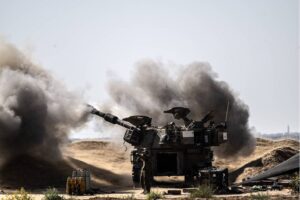
What’s next for ICJ ruling:
The ICJ order will be transmitted to the United Nations Security Council, where states can decide to take united action to enforce the court’s orders. Security Council resolutions are also legally binding.
ICJ orders are legally binding, but not enforceable.
However, the US has a veto, which it has historically used to shield Israel from the consequences of violating international law.
RECOMMENDED READING: ICJ rules Israel must stop Rafah operation, what’s next?
Former UN Special Rapporteur Michael Lynk comments on significance of ICJ ruling:
Mondoweiss reports: Friday’s ICJ order augurs deeper shifts in how the world addresses Israeli violations of international law, shifts of an “extraordinary” nature, says Michael Lynk, former UN Special Rapporteur on the human rights situation in occupied Palestine.
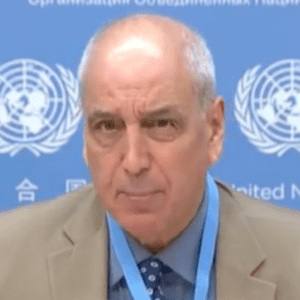
“There’s very little hope, probably less than zero, that Israel would obey what the Court has ordered,” Lynk told Mondoweiss, following today’s ICJ ruling.
And, Lynk adds, regardless of what the UN’s top judicial body says, the Biden administration will likely support Israel to the last, vetoing resolution after resolution at the UN Security Council.
[Biden is a top recipient of pro-Israel money.]
Still, as Lynk is known to say, “international law is closer to power than to justice.”
“International law, by itself, will never liberate Palestine or deliver a two-state solution,” says Lynk. “But it will, I think, give strength to attempts by those who say either a two-state solution is what has to happen, or it’s going to have to be a one-state democratic solution that relies upon the rule of law for all that live between the river and the sea.”
More than anything else, it’s the speed of recent, seemingly unlikely events that inspire Lynk the most.
“I think that the possibility of rapid change occurring suddenly, out of the blue, because of escalating events, may well be what we see around the corner.”
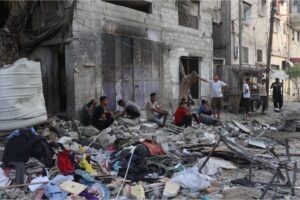
Only one hospital in northern Gaza is functional, but it’s inaccessible:
OCHA reports: As of 24 May, only one hospital in northern Gaza, Al Awda, is partially functional, but it is inaccessible. Communicable diseases are on the rise, with children under five particularly affected, the World Health Organization reports.
Shortages in fuel, medical supplies and equipment are threatening the ability of the remaining health facilities in Gaza to operate. In Deir al Balah, the situation remains critical at Al Aqsa Hospital, where on the night of 23 May, the electricity was largely cut off, due to the depletion of fuel to operate generators. Humanitarian organizations were able to deliver 15,000 liters of fuel to the hospital on 24 May.
Some displaced people in central Gaza are now surviving on three per cent of the minimum standard for daily water needs, warn international NGOs.
On 22 May, Israeli forces reportedly released an unconfirmed number of Palestinian detainees at Kissufim Crossing in Al Qarara, east of Khan Younis. According to Palestinian media reports, 30 detainees were released, including at least one woman.
Between the start of the military operation in Rafah on 7 May and 23 May, only 906 truckloads carrying humanitarian assistance entered Gaza through all operating entry points, an average of about 53 per day. This is in contrast to the 500 trucks per day before October 7th (when Gaza had a viable agricultural sector and food processing plants).
These figures do not include commercial trucks, as the UN has been unable to observe the arrival of private sector cargo through Kerem Shalom crossing due to insecurity.
Supplies that are dropped off at the crossing without safety or logistical viability for humanitarian organizations to pick them up are also not included in these statistics.
Just over 1 million liters of fuel have entered the Gaza Strip since the beginning of the military operation in Rafah. This represents an average of 29 per cent of fuel allocations that would have been received under arrangements in place prior to 6 May, further affecting the functioning of bakeries, hospitals, water wells, and other critical infrastructure.

